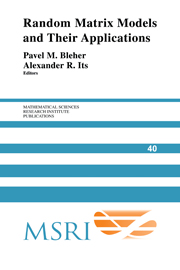Book contents
- Frontmatter
- Contents
- Preface
- Symmetrized Random Permutations
- Hankel Determinants as Fredholm Determinants
- Universality and Scaling of Zeros on Symplectic Manifolds
- z-Measures on Partitions, Robinson-Schensted-Knuth Correspondence, and β = 2 Random Matrix Ensembles
- Phase Transitions and Random Matrices
- Matrix Model Combinatorics: Applications to Folding and Coloring
- Interrelationships Between Orthogonal, Unitary and Symplectic Matrix Ensembles
- Dual Isomonodromic Tau Functions and Determinants of Integrable Fredholm Operators
- Functional Equations and Electrostatic Models for Orthogonal Polynomials
- Random Words, Toeplitz Determinants, and Integrable Systems I
- Random Permutations and the Discrete Bessel Kernel
- Solvable Matrix Models
- The τ-Function for Analytic Curves
- Integration over Angular Variables for Two Coupled Matrices
- Integrable Lattices: Random Matrices and Random Permutations
- SL(2) and z-Measures
- Some Matrix Integrals Related to Knots and Links
Functional Equations and Electrostatic Models for Orthogonal Polynomials
Published online by Cambridge University Press: 25 June 2025
- Frontmatter
- Contents
- Preface
- Symmetrized Random Permutations
- Hankel Determinants as Fredholm Determinants
- Universality and Scaling of Zeros on Symplectic Manifolds
- z-Measures on Partitions, Robinson-Schensted-Knuth Correspondence, and β = 2 Random Matrix Ensembles
- Phase Transitions and Random Matrices
- Matrix Model Combinatorics: Applications to Folding and Coloring
- Interrelationships Between Orthogonal, Unitary and Symplectic Matrix Ensembles
- Dual Isomonodromic Tau Functions and Determinants of Integrable Fredholm Operators
- Functional Equations and Electrostatic Models for Orthogonal Polynomials
- Random Words, Toeplitz Determinants, and Integrable Systems I
- Random Permutations and the Discrete Bessel Kernel
- Solvable Matrix Models
- The τ-Function for Analytic Curves
- Integration over Angular Variables for Two Coupled Matrices
- Integrable Lattices: Random Matrices and Random Permutations
- SL(2) and z-Measures
- Some Matrix Integrals Related to Knots and Links
Summary
This article deals with connections between orthogonal polynomials, functional equations they satisfy, and some extremal problems. We state Stieltjes electrostatic models and Dyson's Coulomb fluid method. We also mention the evaluation of the discriminant of Jacobi polynomials by Stieltjes and Hilbert. We show how these problems can be extended to general orthogonal polynomials with absolutely continuous measures or having purely discrete orthogonality measures whose masses are located at at most two sequences of geometric progressions.
1. Introduction
This is a survey article dealing with connections between orthogonal polynomials, functional equations they satisfy, and some extremal problems. Although the results surveyed are not new we believe that we are putting together results from different sources which appear together for the first time, many of them are of recent vintage. One question in the theory of orthogonal polynomials is how the zeros of a parameter dependent sequence of orthogonal polynomials change with the parameters involved. Stieltjes [1885a; 1885b] proved that the zeros of Jacobi polynomials increase with β and decrease with a for a > -1 and β > -1. The Jacobi polynomials satisfy the following orthogonality relation [Szego 1975, (4.3.3)]:
In Section 2 we state Stieltjes's results and describe the circle of ideas around them. Section 3 surveys the Coulomb Fluid method of Freeman Dyson and its potential theoretic set-up. We shall use the shifted factorial notion [Andrews et al. 1999]
Information
- Type
- Chapter
- Information
- Random Matrix Models and their Applications , pp. 225 - 244Publisher: Cambridge University PressPrint publication year: 2001
